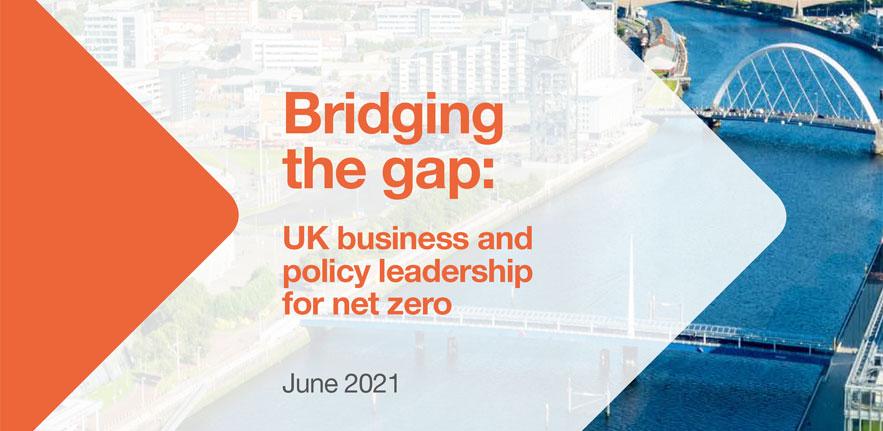
29 June 2021 - This week CLG UK published a new report Bridging the Gap: UK business and policy leadership for net zero.
The report sets out steps for how business and government can work together to bridge the gap between present action and necessary ambition. It builds on CISL analysis into progress made towards reducing emissions in four key sectors: power and energy, built environment, road transport, and agriculture and land use, CLG UK’s publication Bridging the Gap.
The report was launched through a high-level webinar exploring the challenges and opportunities for the UK to demonstrate climate leadership through the Net Zero Strategy to ensure it is on track to meet its ambitious medium- and long-term targets.
Clare Shine, Director and CEO of CISL opened the event, saying:
“The Corporate Leaders Group has frequently defined the UK government’s response to climate change. CISL’s analysis shows the UK has made significant progress, with increasing ambitious commitments by both government and businesses. However, this is not consistent across all sectors and there is widespread recognition that we lack clear plans on how we are going to deliver against the targets on paper.”
Introducing the report Eliot Whittington, Director of CLG UK said:
“I’m excited to publish this report which is a new departure. Rather than focusing solely on the challenges for policy makers or the challenge for business, this is an attempt to weave together those narratives – recognising that business and government need to work together on the climate transition if we are to have a successful, sustainable economy.”
Peter Simpson, CEO, Anglian Water, and co-Chair, CLG UK continued the discussion, highlighting opportunities for business outlined in the report:
“I like the fact that the report focuses on ‘how’ we can go about achieving net zero, focusing on the knotty issues like decarbonising building stock and transport and also bringing out opportunities in areas of agriculture and land use. Our experience, particularly when we look at infrastructure, is that there are some fantastic opportunities. One of the recommendations is about collaboration between construction companies to cut carbon. We have found that collaborating and aligning with our supply chain and SMEs has been critical to our progress towards net zero.”
Carey Causey, President, Ball Beverage Packaging EMEA, Ball Corporation provided advice to companies yet to embark on their net zero journey:
“Get started if you haven’t already. Your customers, your employees, are counting on you to do that. Sometimes it can be a bit daunting but most of us like to think of our companies as leading something - leading a change. The private sector has such a vital role to play in accelerating the transition. Business, government and finance have to be able to talk to each other and work in concert.”
Stephen Rouatt, CEO, Signify UK&I discussed implications for businesses where country progress towards net zero is slow:
“If we can all agree that net zero becomes the base minimum this means you need to become a sustainable company and we look at that from the front all the way to the back. If you want to be a country that has manufacturing capacity located locally, you’ll be pushing for your own manufacturing sites to be as efficient as possible because that will be what’s attractive to other countries to utilise. If as a country, you choose not to push towards net zero then as a company I won’t move my manufacturing sites. I’ll have to pick somewhere else. That will become part of the base minimum – everyone will need to do this. We’ll end up pulling those countries along.”
Colin Matthews, Non-Executive Chairman of EDF in the UK, and co-Chair, CLG UK concluded the event with a call to action for government and business to take leadership:
“We need strategies, policies and incentives set from government. As businesses we need to encourage others to get on board, whether they are smaller companies or companies in your supply chain. It’s clear that here in the UK we would rather be in the front rather than at the back of the queue so let’s get on with it, let’s set the examples and position ourselves in that leadership role. We need to integrate the efforts of business and government more effectively to win in the race to net zero.”




